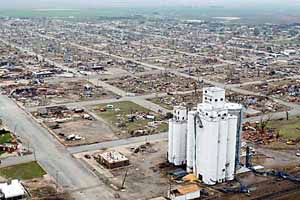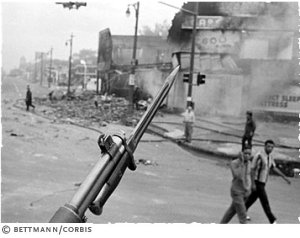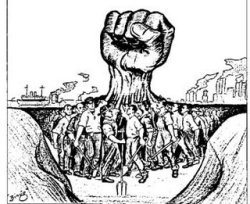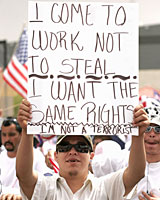Relief and the Command Post: an update on Greensburg and Kansas Mutual Aid
In Thursday’s post, I promised an update on Kansas Mutual Aid and the situation in Greensburg. Since then, I’ve gotten two updates in my e-mail: one of them was helpful; the other was outrageous. Let’s start with the outrage: a whole town was completely wiped out. People’s lives and homes and farms have been destroyed by terrible tornadoes. And the government’s idea of relief apparently consists in locking down the city, forcing volunteer relief workers to register at their self-declared Command Post,
and using the threat of arrest–and disappearing
–to throw volunteers out of town if they intend to help free people clean debris from their own ruined homes while holding the wrong political views. Here is the story of their visit to Greensburg this weekend:
Tornado Ravaged Greensburg, Kansas: Kansas Mutual Aid Relief Workers forced out of city by police
Saturday May 19, 2007
by Dave StranoOn Saturday May 19, five members and volunteers affiliated with Kansas Mutual Aid, a Lawrence based anarchist collective, made the trek back to Greensburg to again help in relief efforts in the tornado ravaged city. A week earlier, four KMA members had traveled to Greensburg on a fact finding mission to assess the situation there. What KMA members found was a militarized, entirely destroyed city where relief efforts were moving tragically slow.
Today’s trip back to Greensburg by KMA members and volunteers was intended to solidify the bonds we had created in the first trip, and establish a base of operations for future relief efforts. KMA spent the morning working on a house with members of AmeriCorps, and then proceeded to meet with contacts with the Mennonite Disaster Services.
We then headed out of town to a church just outside of city limits that we were told would be a place we could probably set up a base camp for our work. The church had been converted into a fire station by the state, so we continued down the road and met a farmer who was willing to work with us and let us use his land.
Soon after meeting the farmer, we were approached by officers with the Dickinson County Sheriff’s Department. After a brief exchange, the officers left, and we were told to report to the Kiowa County Emergency Response Command Post to receive official permission to set up our base of operations. We were notified that if we did not do so, we would risk having our operation ceased by the state.
Two of our delegation went to the Command Post, while the other three of us went to the County Courthouse to pick up some water and provisions being offered by the Red Cross. While we were picking up water and food, I was approached by an Olathe Police Officer named Ty Moeder who knew my face and identity. I was ordered to take my hands out of my pockets and follow the officer to a side street
to avoid making a scene.I and the other people with me followed the officer, and were repeatedly ordered to keep our hands out of our pockets, where they could be seen by the officer. Soon more officers approached, as well as at least one member of the Kansas Bureau of Investigation, and some people from FEMA. Surrounded by agents of the state, we were ordered to produce our identification.
When I asked the police why we were being detained, Officer Moeder responded
We need to check to see if you are affiliated with the anarchists.At this moment, our remaining two comrades approached to see what was happening. They were detained as well, and made to produce their identification.Officer Moeder asked how we had gotten in to the city.
We drove in,someone replied.
They weren’t supposed to let you in at the road block,responded Moeder, seemingly frustrated and perplexed by that answer.
They even gave us a day pass to drive in and out,we shot back.A waiting game ensued for the next several minutes, with more officers approaching, now numbering almost fifteen. A Lawrence police officer approached, and was ordered to take photos of the car we had driven that was parked down the street. Officer McNemee from the Lawrence Police Department took extensive photos of the car, even of the inside contents of the vehicle.
Officer Moeder ordered me to step away from the rest of the relief workers and speak with him.
You’re being ordered to leave and not return. This is not negotiable, not appealable. You can’t change it. If you return you’ll be arrested on site. And believe me, you don’t want to push that right now. This system is pretty messed up, and you wouldn’t be issued bail. You’d disappear in the system.I asked repeatedly what we had done and why we were being ordered to leave the city.
You’re part of a dangerous anarchist group that will only drain our security resources,he responded.We’ve been monitoring your website and e-mails, we know what kind of agenda you have.
So this is about our political beliefs?I asked.
No,he responded.This is about you being federal security threats. Kansas Mutual Aid is not welcome in this city, end of story. I know you are going through legitimate means to work in the city, and you’re story seems picture perfect, but we know who you are, and you’re not allowed here.We were ordered back into our car and escorted out of the city by several police vehicles with their lights flashing, and left just outside the city.
We returned to Lawrence just moments ago, unhindered in our resolve to provide support to the people in the disaster area. We will continue to work in whatever capacity we can in the areas around the city that we may still be allowed into, and provide support to those entering the city.
The area is a police state, to be certain. Police and Law Enforcement from across Kansas and the country are making the rules about everything. Relief workers were banned from Greensburg today because of their political beliefs and work against oppression and tyrannical state control.
We will still be doing our presentation on Monday at the Solidarity Center, 1109 Mass Street in downtown, and at this point, are still planning on doing some sort of relief work on Memorial Day Weekend, even if that limits us to the farms in the surrounding area.
A longer, more in depth update with an announcement for future action will come soon. Please spread this story far and wide.
In love and solidarity,
Dave Strano, on behalf of KMA
Kansas Mutual Aid is facing down a gang of self-appointed armed relievers who have taken it upon themselves to tell local farmers whom they may, and whom they may not, invite to help them clean out their homes or get food and clean water. In the midst of a humanitarian catastrophe, they have decided that shoring up their own command-and-control structure against even the most ill-defined menace from people politically oppose their claims to authority is more important than whether or not the victims of the Greensburg tornadoes can get help in putting their lives back together.
I mentioned that I had e-mailed Kansas Mutual Aid to ask where out-of-staters could send money or supplies to support their efforts in Greensburg. They replied that they don’t have a PayPal account yet, but that money to support their relief work can be sent to their P.O. Box. Checks can be made out to Kansas Mutual Aid.
Kansas Mutual Aid
PO Box 442438
Lawrence KS 66044
The situation is developing rapidly, so I’ll post any new information that I get. Whatever happens, KMA will be doing what they can to provide desperately-needed help in a really ghastly situation. Keep them in your thoughts.




